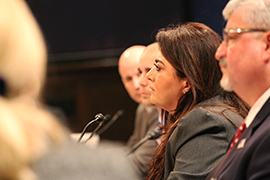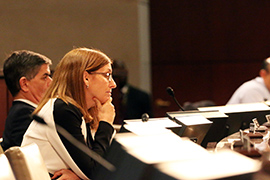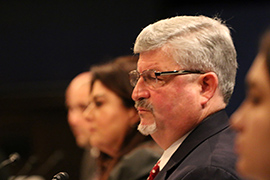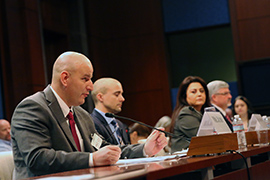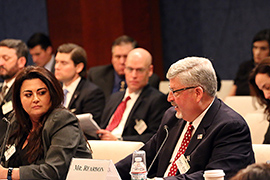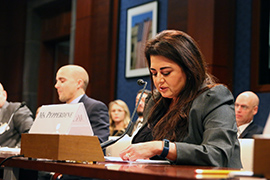- Slug: BC-CNS-Border Beef,750
- Photos available (thumbnails, captions below)
By ARIANA BUSTOS
Cronkite News
WASHINGTON – Frontline border agents told a House panel Tuesday that a wall is just one thing needed to secure the border, saying they also need better technology, more officers and better incentives to attract and keep agents.
The officials from the unions representing Border Patrol and Customs and Border Protection workers said their agencies are thousands of officers below budgeted levels, and recruitment cannot keep up with retirements and with officers leaving a demoralized force.
“Morale is at an all-time low,” said Rosemarie Pepperdine, a representative of Local 2544 in Tucson of the National Border Patrol Council.
The hearing before the House Homeland Security Committee’s Border and Maritime Security Subcommittee comes as the White House is reportedly pressing a request for $18 billion over the next 10 years to construct a wall along the Southwest border.
That request was one of the immigration items discussed – along with protection for immigrants who are about to lose protection under the Deferred Action for Childhood Arrivals program – between the president and lawmakers at the White House today.
Rep. Martha McSally, R-Tucson, who called the hearing, praised the work of the border and customs agents, who she said are “the most important border security and trade facilitation resource we have.”
“Unfortunately, they are in short supply these days, which has created a national security and economic vulnerability that this Congress must address,” she said in her opening remarks.
The union officials agreed, saying that the understaffing poses a threat to agents’ safety as well as their ability to do their jobs.
National Border Patrol Council President Brandon Judd said the agency is “currently almost 2,000 agents below the congressional floor of 21,370,” leaving officers covering large areas where backup can be more than 15 to 20 minutes away.
“As someone who has had to struggle to arrest a violent subject on more than one occasion, that kind of response time is equivalent to no response at all,” Judd said.
But efforts to hire new agents have been hampered by a lengthy and cumbersome process that includes strict polygraph tests, which can leave applicants waiting a year or more to hear if they have been hired.
Jon Anfinsen, president of Local 2366 of the border patrol union in Del Rio, Texas, said the hiring problems are compounded by high turnover rates, with current officers leaving the agency because of long hours, low pay in remote postings and increasing violence.
“Border Patrol needs to do a better job of making itself more competitive and desirable,” Anfinsen said. “Both for current agents and prospective employees.”
Customs and Border Protection also faces shortages at points of entry – including Nogales, which is hundreds of officers short. That has forced the agency to shift workers from airports and other ports, creating safety concerns in those places, said National Treasury Employees Union President Anthony M. Reardon.
Reardon said the stresses of working in a short-handed agency have led to increases in suicides, substance abuse and domestic violence.
All agreed that more needs to be done to recruit and retain officers.
“If you’re going to have to replace people, retaining those you’ve already trained and have all the experience is of the utmost importance,” McSally said.
When pressed about the expense of a border wall, the panelists said it is not the only answer.
Anfinsen said it has become clear they “don’t need a wall from coast to the Gulf,” noting that there are areas in his district where it is just not feasible to build a wall, like over bodies of water.
He said this is where new technology can come in to play to help border agents. He suggested cameras, additional sensor technology and a way to see what’s on the other side of the wall.
Pepperdine shared her own experience with problematic equipment, saying there have been many times when she could see a fellow agent in the field but had to resort to her own cellphone to contact him. The agency-supplied radio does not work in all remote locations, she said.
She is optimistic about language in the Border Security for America Act that calls for future radios to have LTE capability, which would switch radio traffic to a commercial LTE provider if other signals did not work.
Pepperdine agreed that there is no “single solution” to the issues at the border. She and others said it will take more fencing, improved processing of suspects and better equipment, in addition to more officers.
^__=
Web links:
_ McSally statement: https://homeland.house.gov/wp-content/uploads/2018/01/1-9-18-McSally-Open.pdf
_ Judd testimony: http://docs.house.gov/meetings/HM/HM11/20180109/106754/HHRG-115-HM11-Wstate-JuddB-20180109.pdf
_ Pepperdine testimony: http://docs.house.gov/meetings/HM/HM11/20180109/106754/HHRG-115-HM11-Wstate-PepperdineR-20180109.pdf
_ Reardon testimony: http://docs.house.gov/meetings/HM/HM11/20180109/106754/HHRG-115-HM11-Wstate-ReardonA-20180109.pdf
_ Anfinsen testimony: http://docs.house.gov/meetings/HM/HM11/20180109/106754/HHRG-115-HM11-Wstate-AnfinsenJ-20180109.pdf
^__=
The National Border Patrol Council’s Tucson local representative decried the state of officers’ equipment, saying there are times she can see her partner but has to call him on her cell phone because agency-supplied radios don’t work. (Photo by Kyley Schultz/Cronkite News)
Rep. Martha McSally, R-Tucson, said customs and border patrol agents are “in short supply these days.” But the shortage is only getting worse, she said, as low morale and cumbersome hiring rules leave the agencies unable to replace officers as fast as they lose them. (Photo by Kyley Schultz/Cronkite News)
National Treasury Employees Union President Anthony M. Reardon said that understaffed ports of entry like Nogales are being manned on a temporary basis with officers pulled from other ports, leaving them short-staffed. (Photo by Kyley Schultz/Cronkite News)
National Border Patrol Council President Brandon Judd told a House Homeland Security subcommittee that Congress needs to increase incentives to attract and retain border agents, who face increasing cartel violence. (Photo by Kyley Schultz/Cronkite News)
Rosemarie Pepperdine, a Border Patrol union official from Tucson, left, and National Treasury Employees Union President Anthony M. Reardon said short staffing, long hours and growing violence have left agents demoralized. (Photo by Kyley Schultz/Cronkite News)
Rosemarie Pepperdine, the National Border Patrol Council representative for the union’s local in Tucson, said current border fencing lets officers do their jobs better but it is not “a single solution to illegal immigration and drug trafficking.” (Photo by Kyley Schultz/Cronkite News)
